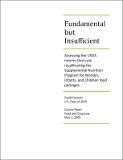| dc.description.abstract | The United States Department of Agriculture’s Food and Nutrition Service division has promulgated an interim final rule which recalibrates and fundamentally alters the focus of the seven food packages available through the Supplemental Nutrition Program for Women, Infants, and Children (WIC). From one test site in Pineville, Kentucky, the WIC program now serves over half of all infants in the United States, approximately a quarter of all children ages one through four, and nearly one million adolescent and adult women. The addition of cash vouchers for the purchase of fruits and vegetables is the key change to the WIC food packages. To keep the program cost-neutral, cuts were made to monthly allowances for milk and other dairy products as well as for juice and eggs. Other changes were also made: the inclusion of more food alternatives for culturally-diverse WIC recipients, a focus on whole grains, and the inclusion of baby food and bananas for infants. Nonetheless, these changes, while fundamental, do not go far enough. FNS did not implement the fruit and vegetable benefit at the level recommended by scientists and nutritional experts. FNS also made unfortunate decisions which contradict sound nutrition science, such as the removal of white potatoes from the fruit and vegetable benefit and the exclusion of more culturally-diverse food substitutes, such as yogurt, from the revised packages. These trade-offs are the result of the FNS decision to prioritize serving as many qualifying participants as possible over fully meeting the needs those at the greatest nutritional risk. This paper first assesses the development of WIC and analyzes the proposed changes to the food packages, with a special emphasis on the fruit and vegetable benefit. This paper then argues that these changes are insufficient to combat the dual problems of obesity and malnutrition plaguing the neediest WIC participants and makes recommendations for future changes to the WIC program. | en_US |


